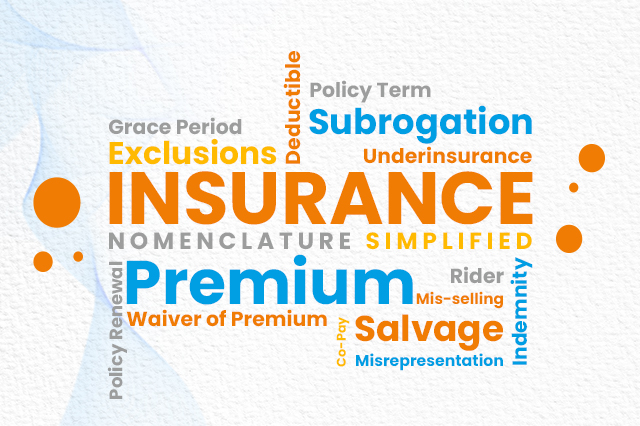
“ सेवा, सुरक्षा और समाधान ”

Insurance Nomenclature Simplified
Welcome, potential Policyholder!
Seeking expert insurance guidance? Look no further! Choosing the right insurance can feel overwhelming, especially with its obtuse language. Let's delve into some crucial terms to equip you, before diving into the details of insurance policies.
1. Exclusions - Your Coverage Boundary:
In insurance, an exclusion refers to specific risks, situations, or conditions that are not covered by an insurance policy. Exclusions are detailed in the policy contract and define the limits of coverage. Imagine you're buying home insurance. While theft is covered, an exclusion might be flooding due to natural disasters. Exclusions are crucial; not understanding them could lead to uncovered losses and financial heartache.
2. Deductible - Your Initial Responsibility:
This is the amount of money an insured person must pay out of pocket before the insurance company begins to cover the costs. Think of the deductible as your initial financial contribution before the insurance kicks in. For instance, a car insurance deductible of ₹5,000 means you pay the first ₹5,000 for repairs if your car suffers ₹10,000 damage. The insurance covers the remaining ₹5,000.
3. Co-pay - Sharing the Bill:
A co-pay is a fixed fee paid by the policyholder for covered services or medications at the time of use. It's set by the insurance company, stated in the policy, and helps split costs between the insurer and policyholder, aiming to control expenses and promote appropriate utilization. Let's say your health insurance has a ₹300 co-pay for doctor visits. You pay ₹300 each time, and the insurance covers the rest, regardless of the total cost.
4. Premium - The Protection Price Tag:
The premium is the regular payment that keeps your policy active. Think of it as a subscription fee for continued coverage. Premiums are based on various factors like age, risk profile, and chosen coverage limits.
5. Indemnity- Making You Whole Again:
Indemnity in insurance refers to the principle of being made financially whole after experiencing a covered loss. In simpler terms, your insurance company compensates you for the loss, aiming to bring you back to the same financial position you were in before the event occurred. Indemnity covers the value of the loss, not necessarily the replacement cost. It's not getting rich -You get what you lost, not a profit.
Examples of indemnity in different types of insurance:
Car accident: Insurance reimburses repair costs, not giving you extra cash.
House fire: They rebuild or pay to rebuild, not exceeding its pre-fire value.
6. Salvage-What's Left Behind:
In insurance, "salvage" refers to the damaged remains of your property after a covered loss. Essentially, it's what's left over after the insurance company has compensated you for your loss. After paying your claim, the insurance company may take ownership of the salvage. This is common for cars declared "total losses" in accidents.
7. Subrogation- Recovering What is Rightfully Yours:
Subrogation allows your insurance company to recover funds from the party responsible for your loss. Imagine someone crashes into your car, and your insurance pays for repairs. The insurance company might then sue the at-fault driver to recover those costs.
8. Underinsurance- Not Enough Coverage:
This is a situation where there is insufficient insurance to fully cover a loss. The policyholder is left paying the difference out of pocket. This leads to stress, delayed repairs/treatments, and potentially jeopardizing financial stability. For example – your asset is valued at Rs 50 lakhs but your Home Insurance is underinsured at Rs 30 Lakhs. A fire damages your asset worth Rs 45 Lakhs. The difference of Rs 15 Lakhs has to be borne by you. Underinsurance is a risk. Be proactive and protect yourself! Regularly review your coverage limits and adjust them based on property value, medical needs, and rising costs.
9. Waiver of Premium:
Waiver of premium is a provision found in many insurance policies, particularly life insurance and disability insurance policies. This provision allows the policyholder to stop paying premiums while still maintaining coverage under the policy if certain conditions are met. Essentially, the insurance company waives the premium amount for the policyholder, during a period of disability or incapacity. The conditions for activating a waiver of premium benefit vary depending on the specific terms of the insurance policy, but they typically involve the policyholder becoming disabled or incapacitated for a specified period, such as six months or longer. The disability or incapacity usually must be certified by a qualified physician or medical professional. This benefit provides valuable financial security to policyholders who may face income loss due to disability or incapacity, ensuring that they can maintain their insurance coverage when they need it most without the burden of premium payments.
10. Mis-selling: Beware of the Unwritten Rules
Mis-selling happens when an insurance product is misrepresented or sold to meet the Agent’s sales targets or commissions, not your needs. This could involve concealing exclusions, exaggerating benefits, or pressuring you into an unsuitable policy. Understand your needs and research different policies before speaking to an agent. Don't hesitate to ask clarifying questions and request written details of the policy terms and exclusions. Don't be pressured to sign before you fully understand what you're buying. If you suspect you've been mis-sold, report it to the insurance company and regulatory authorities.
11. i. Misrepresentation:
Think of this as telling "white lies" on your insurance application. Whether intentional or unintentional, providing inaccurate or incomplete information can have serious consequences:
ii. Claim Denied: If your misrepresentation led the insurer to underestimate your risk, they might deny your claim altogether, leaving you financially exposed.
iii. Policy cancellation: The insurer can cancel your policy if they discover misrepresentation, even after a claim has been paid.
Increased premiums: If the insurer discovers the truth later, they might significantly increase your premiums to reflect the higher risk.
Honesty is always the best policy! Disclose all relevant information accurately to avoid jeopardizing your coverage and financial security.
12. Grace Period- Breathe Easy (For a While!):
Life happens, and sometimes bills get delayed. The grace period is your safety net in such situations. It's a short window (usually 15-30 days) after your premium due date during which you can still make the payment without your policy lapsing. One should not rely on it consistently; it's meant for occasional delays. Your insurance remains active during the grace period, but late fees may apply.
13. Policy Renewal- Keeping Your Protection Going:
In insurance, renewal refers to the process of extending your existing insurance policy for another term. It's like subscribing to a service, but instead of receiving products or entertainment, you maintain your financial protection against specific risks. Think of renewal as the checkpoint where you decide to continue your insurance coverage for another term. Typically, the insurer will send you a renewal notice with the new premium amount and any changes to the policy terms. Your needs and risk profile might change over time. Assess if your current coverage still aligns with your situation and adjust your policy accordingly during renewal.
14. Rider:
In insurance, a rider is an optional provision or amendment added to an insurance policy that modifies or expands its coverage beyond what is typically included in the standard policy. Riders allow policyholders to customize their insurance coverage to better suit their individual needs or preferences. Riders can provide additional benefits, coverage enhancements, or specialized protection that may not be included in the base policy. They can be added to various types of insurance policies, including life insurance, health insurance, disability insurance, and property insurance. Some examples of riders are -
Disability Income Rider - Offers supplemental income to the insured if they become disabled and unable to work.
Critical Illness Rider: Pays a lump sum benefit if the insured is diagnosed with a covered critical illness specified in the rider, such as cancer, heart attack, or stroke.
15. Policy term:
The policy term in insurance refers to the duration of time for which an insurance policy provides coverage. It specifies the period during which the terms and conditions of the policy are in effect, including the coverage limits, premiums, and any other provisions outlined in the policy contract. For example, a term life insurance policy might have a policy term of 20 years. This means that the policy provides coverage for the insured individual for 20 years from the date the policy becomes effective. During this time, if the insured individual were to pass away, the death benefit would be paid out to the designated beneficiaries. However, if the insured individual were to outlive the policy term, the coverage would expire, and no benefits would be payable upon the policy's termination.
This list is a helpful starting point, but your insurance journey is unique! Tailor your knowledge based on your needs. Don't hesitate to ask your agent or subject matter experts to feel confident about your coverage.
© 2026 MYBSK All Rights Reserved. Designed By SKALY INFOTECH PVT.LTD.
